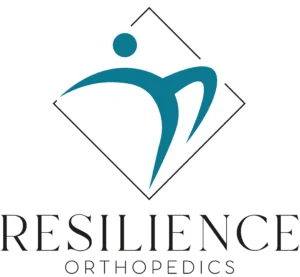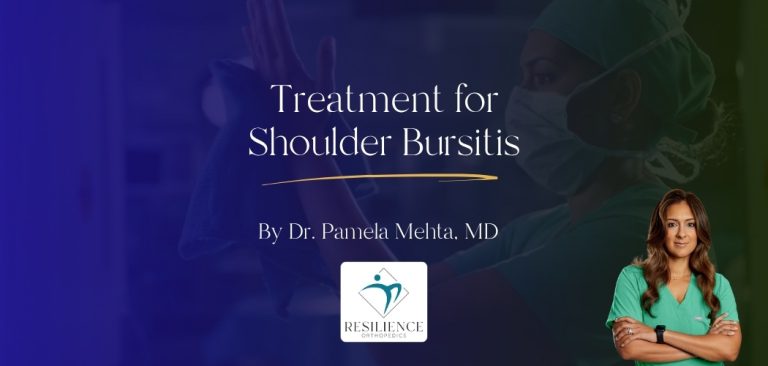Shoulder Impingement Treatment in San Jose
Dr. Pamela Mehta MD
Shoulder Surgeon in San Jose

Dr. Pamela Mehta is an experienced shoulder surgeon renowned for her expertise in sports injuries and joint arthritis. She is the founder of Resilience Orthopedics.
With an impressive career and training under leading innovators, she has served as Chief of Orthopedics and National Orthopedic Director for a major orthopedic hospitalist group and advises several publicly traded companies.

Table of Contents
What is Shoulder Impingement?
Shoulder impingement makes up roughly half of all shoulder pain seen by shoulder surgeons. It is often seen in those who spend a lot of time performing overhead movements. This includes groups like swimmers and construction workers.
Impingement involves the swelling and trapping of your rotator cuff tendon. This rubs and gets caught between your humerus (long upper arm bone) and acromion.
The acromion is an extension to the top part of your shoulder blade. The gap between this and the rotator cuff muscles narrows when you lift your arms above your head. Any further narrowing of this subacromial space can cause pain, swelling, and stiffness.

Causes of Shoulder Impingement
These symptoms can be caused by:
- Rotator cuff tendonitis. Irritation of your rotator cuff tendons (usually of the supraspinatus muscle) as they rub against your acromion.
- Shoulder bursitis. Inflammation of the fluid filled sac sitting under the acromion. This normally helps to lubricate your shoulder movements, but causes pain when inflamed.
- Impingement. The trapping of your tendon as it gets caught in the narrow subacromial space
Shoulder impingement often comes on gradually. It causes pain when you lift your arm and eventually can give you pain all the time. Causes of shoulder impingement include:
- Shoulder injuries such as rotator cuff injuries and shoulder dislocation.
- Sports that involve repetitive overhead movements such as swimming, baseball, and tennis.
- Jobs that require repetitive overhead movements such as construction workers, painters, or electricians.
- Thickening or calcification of your shoulder ligaments, usually due to age.
- Bony spurs in your shoulder joint due to arthritis or anatomical variations.
Some people get a condition called internal shoulder impingement (posterior shoulder impingement). This is a separate condition that occurs in those that take part in activities that make you reach your arm all the way back, such when a baseball pitcher reaches their arm back before throwing. Internal shoulder impingement involves the glenohumeral joint rather than the acromial space.
Book a Consultation with Dr. Pamela Mehta, MD
The Best Orthopedic Surgeon in San Jose
Dr. Mehta is a board-certified orthopedic surgeon who can help you recover from your joint condition.
We can help if you:
- Are Suffering From Pain and Mobility Issues
- Need Orthopedic Assessment and Advice
- Want Treatment From a Top Orthopedic Doctor
Call On 408-559-3888
or Send a Message
Shoulder Impingement Symptoms
If you get pain in your shoulder when you try to lift your arms above your head, you might have shoulder impingement. The pain often comes on gradually, then worsens over weeks to months.
Symptoms of shoulder impingement include:
- Sudden pain in your shoulder when you lift your arms up
- As the inflammation worsens, constant pain at rest and at night
- Stiffness in your shoulder movements
- Difficulty reaching behind your back, like when getting something out of your back pocket
- Weakness and loss of strength in your shoulder
- Difficulty sleeping on your affected shoulder at night

Often once the pain starts you end up in a vicious cycle. The impingement first causes swelling. This narrows the subacromial space further, which then causes more swelling.
If you are experiencing these symptoms, it’s important that you visit a local shoulder surgeon. The sooner it’s treated, the quicker you’ll recover.
Diagnosis
When you see Dr. Mehta, she will examine the pain and movement in your shoulder joint. She will rule in and out possible causes of pain, and if there are any symptoms which need urgent attention.
Following examination, you may need further tests including an x-ray or a shoulder MRI. These tests help to identify the cause of your pain and rule out any serious injuries which may need an injection or surgery.

Treatment
Treatment in shoulder impingement aims to reduce the inflammation and swelling. If we can do this, we reduce your pain and can end the vicious cycle. If you are still in the early stages your doctor might suggest:
- Resting your shoulder
- Avoiding overhead activities and movements that cause pain
- Regularly placing an ice pack on your shoulder
- Shoulder impingement stretches and exercises
- Anti-inflammatory medication
If your shoulder impingement is severe, or isn’t getting better, Dr. Mehta might advise:
- A structured physical therapy program
- Cortisone injection to reduce swelling
- Regenerative treatments such as Platelet-Rich Plasma (PRP) therapy or stem cell therapy to promote natural healing and tissue repair
- Shoulder impingement surgery
Shoulder impingement surgery involves removing a bone spur and expanding your subacromial space. This makes it easier for your rotator cuff tendons to move freely. This can often be done through shoulder arthroscopy which is minimally invasive. This only leaves a small scar and improves recovery time compared to an “open” bone spur surgery.
Following treatment for your shoulder impingement, full recovery may take weeks or months. You should notice improvements after 2-4 weeks. If you have undergone shoulder impingement surgery, you may need to wear a sling for the following weeks.
Testimonials
Ready to Recover?
Take the first step in getting back to your normal self, and book an appointment with Dr. Mehta today.
We’re ready when you are!
What Shoulder Services Do We Offer?
Shoulder Pain Assessment
Shoulder Pain is frustrating and can impact both your sleep and your mental health. Dr. Mehta is a shoulder doctor and can diagnose your pain, offering various surgical and non-surgical treatments.
Shoulder Surgery
If your shoulder condition is severe, or nothing you have tried has helped, Dr. Mehta can advise you on the options for surgery. She is a shoulder specialist and can offer expert opinion and care.
Treatment of Shoulder Conditions
Frozen Shoulder
Frozen shoulder makes your shoulder stiff and can make movement painful.
Bicep Tendinitis
Bicep tendonitis causes pain in your upper arm and can lead to a bicep tendon tear.
Shoulder Impingement
Shoulder impingement makes it difficult to raise your arms above your head.
Shoulder Separation
Shoulder separation is a sprain in the AC joint near your shoulder.
Shoulder Bursitis
Shoulder bursitis gives you a tender shoulder and makes it difficult to sleep.
Rotator Cuff Tear
Rotator cuff tears can occur during sports and make overhead movements difficult.
Dislocated Shoulder
Shoulder dislocation causes a disformed and painful shoulder and can be recurrent.
Bone Spurs
Bone spurs can form over time and cause pain and impingement.
And Many More!
Dr. Mehta offers diagnosis and treatment of all shoulder conditions and can offer her specialist opinion as an expert shoulder doctor.
Call Us On 408-559-3888
or Send a Message






